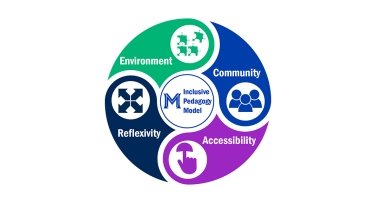Mercy Launches a New Initiative to Foster Greater Inclusivity in Teaching and Learning

Mercy University is announcing the launch of a campus-wide initiative focused on Inclusive Pedagogy (IP), highlighted by a faculty development course that will build on Mercy’s long-standing commitment to equity in education.
The online, self-paced curriculum provides resources, tools and strategies to guide participants in creating an inclusive environment in the classroom. This will be accomplished in part by enabling faculty to recognize and address systemic barriers to education that can hinder students from achieving their fullest potential. This spring, a fully updated release of the course, which was beta-tested last fall, will be open to all full-time and part-time faculty at Mercy.
According to the Chronicle of Higher Education, “teaching inclusively means embracing student diversity in all forms—race, ethnicity, gender, disability, socioeconomic background, ideology, even personality traits like introversion—as an asset. It means designing and teaching courses in ways that foster talent in all students, but especially those who come from groups traditionally excluded in higher education.”
The IP course was designed and developed under the auspices of Mercy’s Center for Teaching and Learning (CTL), led by Juli Steadman Charkes, CTL director. “Our goal was to create a flexible, accessible tool for faculty to evaluate and enhance their teaching in ways that allow every student to feel seen and heard,” said Charkes.
The curriculum was beta-tested with a cohort consisting of Mercy faculty members and Inclusive Excellence Teaching Fellows supported by a seven-year, $1 million grant from the Howard Hughes Medical Institute (HHMI). Key contributors to the course development included Saliha Bava, professor of marriage and family therapy, Renee Haskew-Layton, associate professor, director of the HHMI Inclusive Excellence grant and biology program director; and instructional designers Liz Fritz and Iryna Ashby, whose participation was supported by the HHMI grant.
The team developed the IP course program—the four-pillar “Mercy Model,” a term coined by Ashby—into a flexible, accessible resource for faculty to evaluate and enhance their teaching. Access to an IP Community of Practice, a series of meetings to engage participants in idea-sharing and mutual support, supplemented the self-paced modules.
Faculty lead Bava and Rosaura Uscanga, assistant professor of mathematics, facilitated the beta participants as they worked through the modules. They also solicited valuable insights, best practices and feedback from the participants that would later inform the final course design.
“We set out to provide faculty with a comprehensive pathway to creating a welcoming and affirming atmosphere that promotes student success,” said Bava. “We are confident that participants will come away with a greater understanding of how to ensure every student, through the acknowledgement of the impact of race, gender, ability, socio-economic background and social context, can feel seen and heard as full learning partners.”
“Every student needs to know that their ideas and opinions matter, and that they themselves are valued and supported,” added Charkes. “Our goal was to support the needs of each individual student by creating a culture of belonging. We believe the Inclusive Pedagogy course is an important step toward that goal.”
“The Inclusive Pedagogy program at Mercy University offers a centralized resource for evidence-based practices that will deepen our campus-wide commitment to inclusivity in teaching and learning,” said Dr. Eva M. Fernández, provost and vice president for academic affairs. “This new curriculum will assist faculty in creating a learning environment that not only empowers every student to thrive but also recognizes and celebrates every individual’s unique strengths.”
For more information about the Inclusive Pedagogy course launching this spring, contact the Mercy Center for Teaching and Learning.
